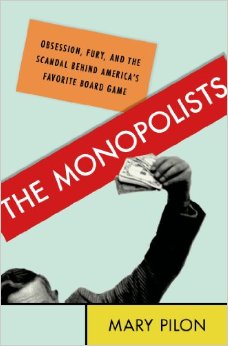Award-winning Journalist; Speaker on the Business of Games, Sports, and Innovation
Mary Pilon is the author of The Monopolists: Obsession, Fury, and the Scandal Behind the World’s Favorite Board Game (Bloomsbury, February 2015), a former sports reporter for the New York Times, and past business reporter for the Wall Street Journal. Her work has been featured in The Best American Sports Writing and garnered awards from the New York Society of Professional Journalists, the Freedom Forum, the Associated Press Sports Editors and the Society of American Business Editors and Writers, among others. She made the Forbes magazine’s first-ever 30 Under 30 list for media. She has appeared numerous times on various shows of the major TV networks: NBC, MSNBC, PBS, Fox Business News, and CNBC. A dynamic keynote speaker, Pilon has spoken at Comic Con, Bullish Conference, Authors at Google, Nerd Nite, New York’s 92nd Street Y, and New York University. She speaks about the nature of innovation, women in business, the business of the sports industry, gaming (board games specifically), and all things Monopoly.
In her talks on The Monopolists Pilon reveals the unknown story of how Monopoly came into existence, the reinvention of its history by Parker Brothers and multiple media outlets, the lost female originator of the game, and one man’s lifelong obsession to tell the true story about the game’s questionable origins. She reveals a fascinating social history of corporate greed that illuminates the cutthroat nature of American business over the last century and provides insights to the business and gaming world of today.
Most think it was invented by an unemployed Pennsylvanian who sold his game to Parker Brothers during the Great Depression in 1935 and lived happily–and richly–ever after. That story, however, is not exactly true. Ralph Anspach, a professor fighting to sell his Anti-Monopoly board game decades later, unearthed the real story, which traces back to Abraham Lincoln, the Quakers, and a forgotten feminist named Lizzie Magie who invented her nearly identical Landlord’s Game more than thirty years before Parker Brothers sold their version of Monopoly. Her game–underpinned by morals that were the exact opposite of what Monopoly represents today–was embraced by a constellation of left-wingers from the Progressive Era through the Great Depression, including members of Franklin Roosevelt’s famed Brain Trust.
Pilon previously worked as a sports reporter at The New York Times, where she was part of the paper’s Olympics team and focused on legal and financial issues in sports. While on staff at the Times, she wrote “Tomato Can Blues,” a narrative long form feature that told the story of Charles Rowan, a cage fighter who faked his own death. The story’s blend of visual elements made it the first-ever graphic novel for the paper and actor Bobby Cannavale narrated an audio version.
From June 2008 to November 2011, Pilon worked at the Wall Street Journal, where she covered various aspects of personal finance and the financial crisis for print and online editions and regularly appeared on national TV and radio. She authored several stories about both unemployment and the changing culture of Wall Street for the paper’s front page. She was part of the Journal’s team that won Gerald Loeb and New York Press Club Awards in 2011 for covering the “Flash Crash” of 2010
A native of Eugene, Ore., Mary Pilon started working for her hometown paper, the Register-Guard as a teenager and reading comic books about journalists. She is an honors graduate of New York University, where she double majored in politics and journalism, and has worked at New York magazine, USA Today, and Gawker.com. Recently, her work has appeared in the New Yorker, Fast Company, Medium and Mental Floss magazine. She spent over a year abroad in Spain, Russia, and China but now calls New York City home.
Praise for Mary Pilon’s Talks
“As someone who has hand-selected hundreds of fun, silly, smart people from all over the world to speak in front of thousands of slightly drunk nerds, I can safely say that Mary has deftly proved multiple times that she can walk the delicate line of informative yet entertaining. While she clearly knows more about the sordid history of Monopoly than anyone, she also clearly knows that a casual discussion will keep an audience so quiet that you can hear a thimble or top hat drop.”
—Matt Wasowski, founder, Nerd Nite
“Mary Pilon was a special guest at the second annual Bullish Conference in Miami, where she told the story of Elizabeth Magie, the real inventor of Monopoly – as, of course, recounted in The Monopolists. Mary’s talk was during cocktails, in a casual environment, where she was able to show a few slides to illustrate the story, but mostly just kept the conference attendees spellbound with storytelling. It was a pleasure having a true investigative journalist in our midst.”
—Jennifer Dziura, founder of the Bullish Conference
Praise for The Monopolists
“In The Monopolists, Ms. Pilon not only tells the strange and at times tragic story of the evolution of America’s favorite board game – she also takes us on a jaunt through turn-of-the-century America, where we learn about such far-flung things as the origins of the price tag, the founding of Atlantic City, and the fact that one of the most coveted addresses in the game was home to some of the earliest gay bars in America. This is a must read for anyone who loves the game, and really, who doesn’t?”
—Erik Larson, author of Devil in the White City and In the Garden of Beasts
“What enormous fun this book is! Clever, engaging, finely crafted, and endlessly surprising – and revealing in passing much about the ghastliness of American corporate greed. Much like the game itself, indeed.”
—Simon Winchester, author of The Professor and the Madman
“Mary Pilon has discovered an enthralling story behind Monopoly, as much a history of our country as of its favorite game. She writes with the assurance and energy of a historian who knows she has struck gold.”
—Gay Talese
“This past November, a New Hampshire woman was charged with domestic violence for slapping her boyfriend during a game [of Monopoly]. The British royal family, Prince Andrew said in 2008, isn’t permitted to play it at home because ‘it gets too vicious.’ All of these people, and my own family, and anyone else who has threatened to eviscerate a loved one over their income-tax accounting, should be required to read Mary Pilon’s enthralling new history of the long, pitched battle over the origins of the game.”
—Slate
“[A] dive into the real Monopoly.”
—Flavorwire, “10 Must-Read Books for February”
“The true – and downright bizarre – origin story of one of the most popular games ever made . . . A brisk read, and the readability is considerably heightened throughout by the author’s sense of outrage . . . Fascinating.”
—The Daily Beast
“Highly entertaining . . . Like Monopoly itself, the book unfolds in interesting directions, probing into lost Quaker communities, the early history of Atlantic City, and how a game originally invented to critique capitalism became its most diverting simulacrum.”
—The Boston Globe
“America’s toy chest is stuffed with games whose origins belie their shiny packaging and family-fun marketing – none more than Monopoly. Mary Pilon’s page-turning narrative unravels the innocent beginnings, the corporate shenanigans, and the big lie at the center of this iconic boxed board game.”
—Stefan Fatsis, author of Word Freak: Heartbreak, Triumph, Genius, and Obsession in the World of Competitive Scrabble Players
“Thanks to Mary Pilon’s meticulous reporting and mellifluous prose, we now know the real story of the corporate greed and relentless cover-up that scars Monopoly, one of the most beloved and successful board games of all time. Finally, the truth is out.”
—William D. Cohan, author of The Last Tycoons



